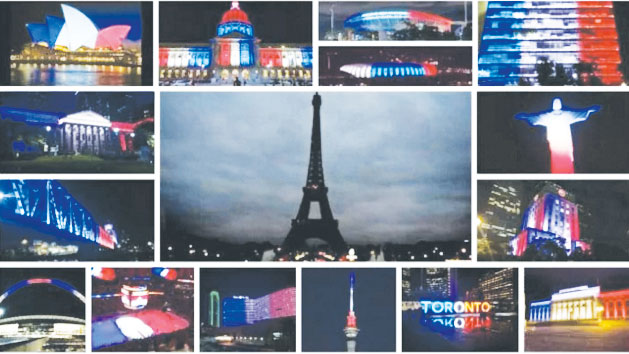Faraway shock and horror hits home
Students unsettled by I.S.I.L. attacks in Paris
Margi Youmans showed this collage during her social studies classes.
“I immediately imagined my mom and dad strolling through the very neighborhoods that were bombarded, and even my minute connection to the situation made me feel sick […] I was really nervous about getting on the plane to go home.”
Penelope Winton ‘18 was on Swiss Semester when she heard of the attacks in which armed men and suicide bombers attacked a stadium, a concert hall, and various restaurants and bars in Paris, France, on November 13, 2015. One hundred and thirty people were killed.
France was placed under a state of emergency and the police were immediately in pursuit of the surviving attackers. At Swiss Semester, Parents’ Weekend was two to three weeks before the attacks. Most parents visited Paris after leaving Switzerland. After the attacks, Winton said, “I felt like we were the perfect target. Fifty affluent, liberal American teens. We might as well have put a giant sign on our heads that said, ‘Epitome of Westernization.’” On November 24, the U.S. Department of State released a travel advisory saying that people should “exercise vigilance when in public places or using transportation” in response to the Paris Attacks, warning of future attacks.
Victoria Chekerdjieva ‘18, who was in Paris right after the attacks, shared Winton’s apprehension. “I felt a little on edge at times. There were police officers everywhere you turned […]and there were posters put up in several places to show support. I also came across a demonstration in the streets, against terrorism and standing up to violence.” Days after the attacks, Chekerdjieva spoke to family friends relaying that “even though what happened was absolutely tragic, people had to return to their daily lives.”
Despite the long distance, the repercussions of the attacks were felt in the Blake community. Anish Aggarwyal ‘18 was at a debate tournament in Wisconsin when the attacks happened. “Everyone in the entire tournament was in shock,” he recalls. The debate topic was the Syrian refugee crisis, and during the tournament, “one of the teams used the Paris attacks as an example of why we should not do anything about [the crisis].”
Even outside of high school debate, the refugee crisis is becoming a more contentious issue. According to the BBC, the attackers were citizens of European countries and were allowed uninhibited movement across their borders under the Schengen Convention. This has lead to further scrutiny of immigration policies, both in the U.S. and within the E.U. The Schengen Convention is a treaty between most of the E.U. countries (except for Croatia, Romania, Bulgaria, Ireland, and the U.K.) and Norway, Iceland, and Switzerland, which allows for relaxed border control between the countries. Together, the countries decide who is allowed into the Schengen area.
However, the attacks have drawn attention to a key problem: not all Schengen members agree on who should be allowed to travel between the countries. Because of this, the Syrian refugee crisis has caused significant tensions between member countries, and could lead to the suspension, or even the end, of the Schengen Convention and spell trouble for the E.U. as a whole.






